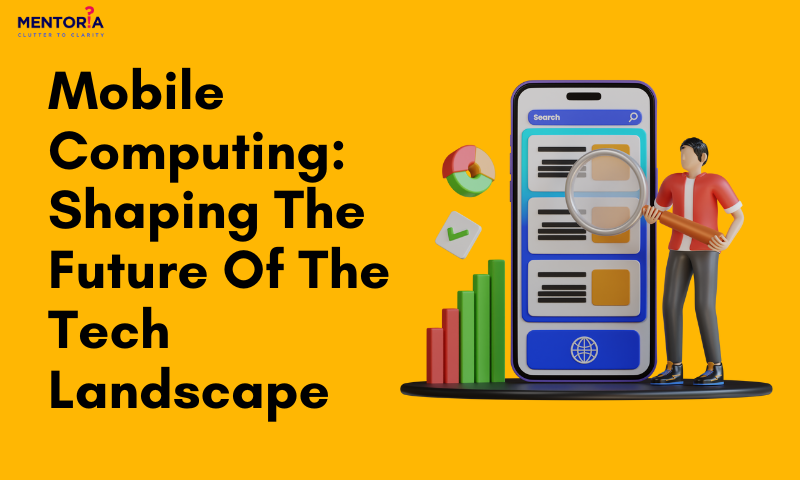Mobile Computing: Shaping The Future Of The Tech Landscape

Jump to Section
In a world where our smartphones have become extensions of ourselves and tablets feel like natural appendages, it’s no surprise that mobile computing is orchestrating a symphony of technological transformation. The curtains are rising on a stage where devices small enough to fit in our palms wield the power of entire data centres from not-so-long-ago. As we witness this technological tango unfold, it’s clear that mobile computing isn’t just about convenience—it’s about the fusion of innovation and daily life, a harmonious duet that’s rewriting the rules of how we interact, work, and play in the digital age. So, fasten your virtual seatbelts as we embark on a thrilling exploration of how mobile computing is sculpting the future of the tech landscape, one app swipe at a time.
The Rise Of Mobile Computing: A Global Phenomenon
The rise of mobile computing has been nothing short of a global phenomenon, revolutionising the way we interact with technology and reshaping industries. With over 3.8 billion smartphone users worldwide, accounting for more than half of the global population, it’s evident that mobile devices have become an integral part of our daily lives. We now carry the power of a computer in the palm of our hands, providing instant access to information, communication, and entertainment on the go.
In recent years, the statistics show that users spend an average of 3 hours and 10 minutes per day on their mobile devices, further emphasising the significant role mobile computing plays in our daily routines. Smartphones have become inseparable companions, keeping us connected with loved ones, managing our schedules, and providing access to a vast digital universe at our fingertips.
The adoption of mobile computing has transcended geographical boundaries, with both developed and developing countries witnessing a surge in smartphone usage. From urban centres to remote rural areas, mobile devices have bridged the digital divide, enabling people from diverse backgrounds to participate in the digital era.
The Evolution Of Tech Industry: Adapting To The Mobile Revolution
Just a decade ago, mobile computing was a distant dream. Today, it’s a global phenomenon that has changed the way we interact, work, and communicate. With the increasing adoption of mobile devices worldwide, the tech industry has witnessed a seismic shift, setting new trends, and opening up a plethora of opportunities. A significant manifestation of this evolution is the exponential growth of mobile apps. With over 2.87 million apps available on the Google Play Store and 1.96 million on the Apple App Store, app development has become a thriving sector within the tech industry. Apps cater to a broad spectrum of needs, ranging from productivity tools to social media platforms and gaming applications. This vast app ecosystem reflects the versatility and widespread adoption of mobile computing.
Moreover, cloud services have become an essential component of the tech industry’s landscape. Mobile devices leverage cloud-based solutions for storage, collaboration, and seamless access to data from any location. The integration of cloud services with mobile computing has transformed how we store, share, and access information, making our digital lives more interconnected and efficient.
Mobile Commerce: A Game-Changer For E-Commerce Industry
The rise of mobile commerce, or m-commerce, has disrupted the e-commerce landscape. In 2021, mobile e-commerce sales accounted for 72.9% of total e-commerce sales worldwide. The convenience of shopping on-the-go, coupled with secure and efficient payment options, has positioned mobile commerce as the preferred choice for modern consumers.
Retailers have keenly capitalised on this trend by optimising their online stores for mobile devices. They have embraced responsive design, ensuring seamless navigation and interaction, regardless of the screen size. Furthermore, the integration of mobile payment solutions, such as digital wallets and mobile banking apps, has streamlined the checkout process, eliminating friction points and enhancing user experience.
Mobile Gaming: A Thriving Industry On The Move
The gaming industry has experienced an extraordinary transformation, with mobile games becoming the cornerstone of this revolution. In 2020, mobile games secured their place as the largest segment of the gaming market, generating a jaw-dropping $77.2 billion in revenue. The advent of powerful mobile processors and immersive graphics capabilities has paved the way for stunning gaming experiences on smartphones and tablets.
From casual gamers to dedicated enthusiasts, mobile gaming has transcended age and geographical borders, becoming a cultural phenomenon. The ubiquity of smartphones has democratised gaming, making it accessible to billions of users worldwide. Furthermore, the introduction of free-to-play models, coupled with in-app purchases, has changed the revenue dynamics of the gaming industry, encouraging continual engagement and monetization opportunities.
The Impact On Workforce: The Age Of Remote Collaboration
Mobile computing has fundamentally transformed how we work, fostering a new era of seamless remote collaboration. The numbers speak for themselves – in 2023, more than 50% of companies allow employees to use their smartphones for work, known as BYOD (Bring Your Own Device)
This transformation is driven by the proliferation of mobile productivity apps and cloud-based services. Tools like file-sharing platforms, project management apps, and video conferencing software have become integral to the modern workforce’s toolkit. The ability to work from anywhere has significantly enhanced productivity, while simultaneously promoting a healthier work-life balance. This flexible work culture has become increasingly attractive to both employees and employers, resulting in increased job satisfaction and improved retention rates.
The Future Of Mobile Computing: Emerging Trends
As mobile computing continues to evolve, several exciting trends are shaping its future:
- 5G Connectivity: The advent of 5G networks is not just an incremental upgrade; it’s a game-changer. With download speeds potentially reaching up to 10 Gbps, 5G will revolutionise how we experience connectivity. This technology isn’t just about faster streaming; it’s about enabling real-time applications like remote surgery, autonomous vehicles, and smart cities. The lower latency and increased capacity will be the backbone of these innovations.
- Internet of Things (IoT): The synergy between mobile computing and IoT is poised to orchestrate a harmonious symphony of smart devices. By 2025, it’s estimated that there will be over 75 billion connected devices globally. Smart homes, wearables, industrial sensors – these are all part of the IoT ecosystem that relies on mobile devices as the conduit for data exchange. The potential impact? Increased efficiency, optimised resource management, and a more connected world.
- Augmented Reality (AR) and Virtual Reality (VR): The marriage of mobile computing with AR and VR technologies will revolutionise various industries. From immersive gaming experiences to practical applications in education, training, and healthcare, AR and VR will redefine how we interact with the world around us.
- Artificial Intelligence (AI): AI-powered mobile assistants and chatbots will become more sophisticated, enhancing the user experience and personalising interactions with devices. AI algorithms will also optimise mobile app functionality, making app suggestions based on user behaviour and preferences.
- Edge Computing: Edge computing will become increasingly prevalent, bringing processing power closer to the device. This trend is particularly relevant for mobile devices. Imagine your phone seamlessly processing data from IoT devices in real-time without waiting for a distant server. This approach not only boosts efficiency but also transforms how we experience responsiveness in our mobile apps.
Embracing The Mobile Computing Revolution With Mentoria’s Guidance
In conclusion, mobile computing has emerged as a game-changer in the tech industry, revolutionising the way we work, communicate, and access information. Its importance extends far beyond convenience, as it has become the cornerstone of modern-day digital transformation.
To navigate the dynamic landscape of mobile computing and harness its full potential, Mentoria is here to support you every step of the way. Our team of mentors is here to help you stay ahead of the curve. Whether you’re an entrepreneur looking to develop a cutting-edge mobile app or a professional seeking to enhance your mobile computing skills, Mentoria’s expert coaching will equip you with the knowledge and confidence to thrive in the tech industry’s mobile-driven future. Join Mentoria today and embrace the mobile computing revolution with the guidance of industry experts who understand the importance of staying at the forefront of technology.









